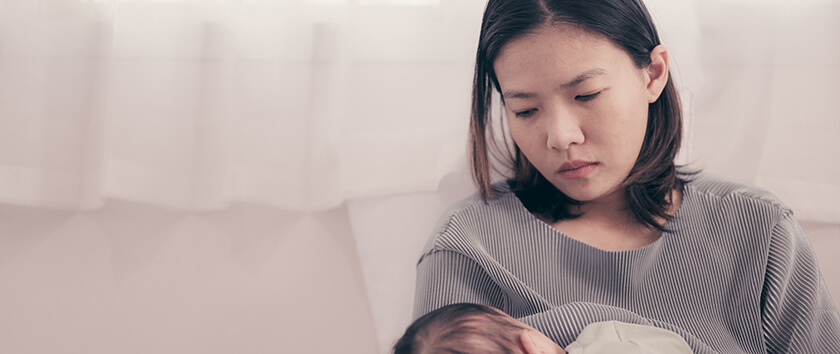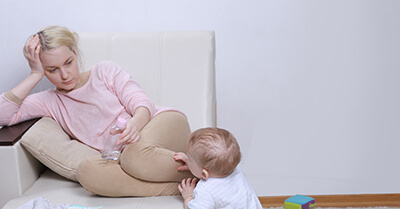
For most families, the birth of a child is a much anticipated and memorable occasion! That first touch and first bond with the newborn baby is one that lasts a lifetime. It is a time of joy and excitement. Yet, it can also be a time of nervousness and anticipation. With so many emotions, it is logical that anxiousness finds its way into the mix. Nerves are a normal part of parenthood. Thoughts of “Am I good enough?”, “Will everything be okay?”, and “Is my baby going to thrive and be happy?” are very normal within two weeks of the baby being born. For many new parents these anxious thoughts do not simply disappear a couple weeks after baby is born. In fact, for many mothers and fathers the anticipated joy has been stolen away by other emotions and replaced with feelings such as, sadness, longing, fatigue, and irritability. Childbirth can be immensely difficult for new mothers. People understand and openly discuss the physical difficulty, but tend to overlook and oftentimes hide the very impactful mental changes childbirth brings. Here we will discuss these mental changes and how to best support the parents involved.


For postpartum moms, their bodies and minds might be very different than what they were used to. Not only is the physical body very different and is now repairing itself, but hormonal fluctuations and lack of sleep weigh heavily on emotions and mental health. Such changes can lead to depression, a pulling away from family, anger, irritability, and a lack of bonding with the new baby. Although more common in mothers, fathers can also develop postpartum mental changes. The increase of responsibility and change to the family structure may lead to depression and increased anxiety in fathers. When parents suffer, children suffer. Postpartum mental health is a very real part of family postnatal health, and is in no way an indication of weakness or failure of the parents. There is help available and the sooner help is received, the sooner the family can begin to recover and enjoy their new baby.
According to https://postpartum.org, “As many as 80 percent of new mothers experience the ‘baby blues’ after delivery. Up to 23 percent of these women will develop a more severe and longer-lasting depression or anxiety, called postpartum depression or postpartum anxiety, after delivery.”
What is postpartum depression and what causes it?
Postpartum depression is an overwhelming form of depression that may not allow a mother to adequately care for her newborn or complete tasks that were manageable pre-delivery. According to Statistics Canada, it can affect up to 10% of new mothers. It is thought to be caused by dramatic physical and emotional changes happening to the body after birth. These substantial physical and emotional changes coupled with the increased responsibility of caring for an infant and a serious lack of sleep, is a lot for any human to process and work through. Postpartum depression is a long-lasting form of depression that incites intense feelings, which should be addressed and treated as early as possible. Many factors can increase a woman’s chances for developing postpartum depression. Some of the most common factors include:
● Having had depression in the past
● The birth or delivery did not go as planned
● Having trouble breastfeeding
● Having had significant relationship or financial troubles in recent months.
Postpartum Anxiety
Postpartum anxiety affects approximately 5 percent of new mothers and falls within the same family as postpartum depression, although it is typically not as severe. Postpartum anxiety is when a new mom is feeling anxious about specific components of being a parent. For example, a mother may irrationally worry or have panic attacks when doing everyday tasks with the baby, for fear something bad might occur to the child. There is a difference between normal levels of worry and irrational thoughts centered around a fear. Again, postpartum anxiety is not a sign of a weak or bad parent, but simply a sign they need support. To truly be there for your new bundle of joy, affected parents should consult a physician as soon as possible to help develop ways to work through, and manage anxiety.
Baby Blues
Baby Blues happen to approximately 80% of new mothers. With so many new responsibilities, changes in hormonal levels, and lack of sleep, it goes without saying that moms can feel overwhelmed. Baby Blues typically develop 2-3 days after the baby is born and last for approximately 2 weeks. Like all postpartum emotional health concerns, baby blues might affect any new parent: mothers, fathers, first time parents, or parents of multiple children. Typical symptoms of baby blues include feeling irritable and exhausted, having mood swings, or lacking the drive to care for yourself. Many mothers suffering from baby blues report anxiety over not thinking they have what it takes to be the best mom possible for their newborn. People need to understand: Mental health is HEALTH. At Pine Health, we help you work through the blues, allowing you to be the best parent possible!
Take these assessments to check in on your mental health
We would love to help you find a Postpartum Psychologist in Edmonton that is the best fit for you.
Please contact us with any questions or book your appointment online with us today.
Postpartum Psychologists
![]()
We are here to help you grow your health!
39
Team Members

8K+
Patients Treated

54
Kids Between Us
Get in Touch
Please fill out the form below and will get back to you.


















